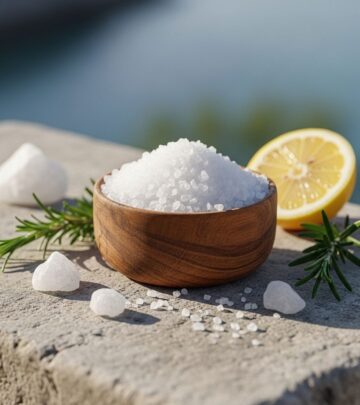10 Effective Home Remedies to Stop a Runny Nose Fast
Kitchen staples deliver gentle relief by thinning mucus and easing nasal discomfort.

A runny nose can be one of the most uncomfortable and persistent symptoms of the common cold, allergies, or sinus infections. The constant dripping, tissue dependency, and nasal irritation can significantly impact your daily activities and overall comfort. While over-the-counter medications are available, many people prefer natural home remedies that are gentle, cost-effective, and readily available in most households.
Understanding the underlying causes of a runny nose is crucial for effective treatment. Whether triggered by viral infections, environmental allergens, temperature changes, or irritants, the body’s natural response involves increased mucus production to flush out perceived threats. Fortunately, several time-tested home remedies can provide significant relief by addressing the root causes and symptoms simultaneously.
1. Essential Oils for Natural Nasal Decongestion
Essential oils offer a powerful, aromatic approach to treating runny nose symptoms through their natural antimicrobial and decongestant properties. The combination of specific essential oils can provide both immediate relief and long-term healing benefits.
Peppermint and Lavender Oil Blend
You Will Need:
- 3 drops peppermint oil
- 5 drops lavender oil
- 1 tablespoon carrier oil (optional)
Application Method:
Mix the essential oils and apply the blend to your chest, neck, and the bridge of your nose. For sensitive skin, dilute with a carrier oil like coconut or jojoba oil. Leave the application on and reapply 2-3 times daily for optimal results.
Peppermint oil contains menthol, which acts as a natural decongestant by thinning mucus and increasing the sensation of nasal airflow. This compound also reduces respiratory discomfort and provides a cooling sensation that can immediately improve breathing. Lavender oil complements peppermint with its antibacterial and antifungal properties, helping to address underlying infections that may be causing the runny nose while also providing calming effects.
2. Salt Water Rinse for Mucus Clearance
Saline solutions represent one of the most effective and safest methods for treating runny nose symptoms. This simple remedy works by naturally thinning mucus and clearing irritants from the nasal passages.
Required Materials:
- 1½ teaspoons pure salt (non-iodized preferred)
- 2 cups warm distilled water
- Clean dropper or neti pot
Preparation and Use:
Dissolve the salt completely in warm water to create a isotonic saline solution. Using a clean dropper, administer several drops into each nostril, or use a neti pot for more thorough irrigation. Repeat this process 3-4 times daily until symptoms improve.
The salt water solution works by matching the natural salinity of your body’s fluids, making it gentle on nasal tissues while effectively thinning mucus secretions. This process helps your body expel excess mucus more efficiently while simultaneously clearing allergens, dust, and other irritants from the nasal passages.
3. Steam Inhalation Therapy
Steam therapy provides immediate relief from runny nose symptoms by using heat and moisture to break down thick mucus and open congested nasal passages.
Simple Steam Method:
Fill a large bowl with very hot water and position your face approximately 8-10 inches above the surface. Drape a large towel over your head and the bowl to create a steam tent. Inhale the warm steam for 10-15 minutes, then gently blow your nose to clear loosened mucus.
For enhanced benefits, add 2-3 drops of eucalyptus or tea tree oil to the hot water. These essential oils provide additional antimicrobial properties and can help reduce inflammation in the nasal passages. Repeat this treatment 3-4 times daily for best results.
The warm steam works by increasing blood circulation in the nasal area, which helps reduce swelling and inflammation. Additionally, the moisture helps thin thick mucus secretions, making them easier to expel naturally.
4. Ginger: The Natural Anti-Inflammatory
Ginger has been used for centuries as a natural remedy for respiratory ailments due to its powerful anti-inflammatory, antiviral, and antifungal properties.
Fresh Ginger Preparation:
Grate fresh ginger root and mix with a small pinch of salt. Consume this mixture several times throughout the day, chewing slowly to allow the beneficial compounds to coat your throat and nasal passages.
Ginger Tea Recipe:
Slice 2-3 inches of fresh ginger root and simmer in 2 cups of water for 10-15 minutes. Strain the liquid and add honey to taste. Drink this warming tea 2-3 times daily while symptoms persist.
Ginger contains gingerol and other bioactive compounds that help reduce inflammation in the respiratory system while fighting off viral and bacterial infections that may be causing your runny nose. The warming properties of ginger also help improve circulation and promote natural mucus drainage.
5. Garlic: Nature’s Antibiotic
Garlic possesses remarkable antimicrobial properties that can help address the underlying infections often responsible for persistent runny nose symptoms.
Fresh Garlic Treatment:
Crush 2-3 fresh garlic cloves to release the active compound allicin. Mix with a small amount of honey to improve palatability and consume immediately. Alternatively, add minced fresh garlic to warm meals throughout the day.
Allicin, the primary active compound in garlic, exhibits strong antiviral, antibacterial, and antifungal properties. This natural antibiotic can help eliminate pathogens causing respiratory symptoms while also supporting overall immune system function.
6. Turmeric: Golden Anti-Inflammatory Remedy
Turmeric contains curcumin, a potent anti-inflammatory compound that can help reduce nasal inflammation and support the body’s natural healing processes.
Turmeric Milk Recipe:
Mix 1 teaspoon of turmeric powder with 1 cup of warm milk and a pinch of black pepper (to enhance curcumin absorption). Drink this golden milk before bedtime for anti-inflammatory benefits that work while you sleep.
The anti-inflammatory properties of curcumin help reduce swelling in nasal passages while supporting overall immune function. Regular consumption can help prevent recurring respiratory issues.
7. Eucalyptus Oil for Respiratory Relief
Eucalyptus oil is renowned for its decongestant and antimicrobial properties, making it an excellent choice for treating runny nose symptoms.
Eucalyptus Steam Treatment:
Add 3-4 drops of eucalyptus oil to a bowl of hot water and inhale the steam as described in the steam therapy section. The eucalyptol compound in eucalyptus oil acts as a natural expectorant and decongestant.
Alternatively, mix 2-3 drops of eucalyptus oil with a carrier oil and apply to the chest and neck area for extended relief throughout the day.
8. Apple Cider Vinegar Tonic
Apple cider vinegar’s acidic properties help thin mucus while providing antimicrobial benefits that can address underlying infections.
ACV Drink Recipe:
Mix 1-2 tablespoons of raw, unfiltered apple cider vinegar with 1 cup of warm water and 1 teaspoon of honey. Drink this tonic 2-3 times daily to help reduce mucus production and support immune function.
The acetic acid in apple cider vinegar helps break down thick mucus while the raw, unfiltered variety contains beneficial enzymes and probiotics that support overall health.
9. Honey and Lemon Combination
This classic combination provides both antimicrobial benefits and soothing relief for irritated nasal passages and throats.
Honey-Lemon Remedy:
Mix 2 tablespoons of raw honey with the juice of half a lemon in 1 cup of warm water. Drink this mixture 2-3 times daily for optimal benefits.
Raw honey contains natural enzymes and antimicrobial compounds, while lemon provides vitamin C and citric acid that help boost immune function and thin mucus secretions.
10. Mustard Oil Treatment
Mustard oil has been traditionally used in many cultures for treating respiratory ailments due to its warming and antimicrobial properties.
Mustard Oil Application:
Warm a small amount of mustard oil and gently massage it around the nasal area, chest, and soles of the feet before bedtime. The warming properties help improve circulation and provide overnight relief.
Prevention Strategies and Lifestyle Tips
Preventing runny nose episodes is often more effective than treating them after they occur. Consider implementing these practical strategies:
- Maintain Proper Humidity: Use humidifiers in dry environments to keep nasal passages moist
- Stay Hydrated: Drink plenty of water throughout the day to keep mucus thin and manageable
- Avoid Known Allergens: Identify and minimize exposure to personal allergens
- Practice Good Hygiene: Wash hands frequently and avoid touching your face
- Strengthen Immune System: Maintain a balanced diet rich in vitamins and minerals
When to Seek Professional Medical Care
While home remedies are effective for most cases, certain symptoms warrant professional medical attention:
- Symptoms persisting longer than 10 days
- Fever above 101.3°F (38.5°C)
- Thick, colored nasal discharge
- Severe headache or facial pain
- Difficulty breathing or wheezing
Frequently Asked Questions
Q: How quickly can home remedies stop a runny nose?
A: Most home remedies provide relief within 15-30 minutes of application, with full symptom improvement typically occurring within 2-3 days of consistent use.
Q: Are these remedies safe for children?
A: Many of these remedies can be safely used for children over 2 years old, but essential oils should be diluted and steam treatments should be supervised. Consult a pediatrician for children under 2.
Q: Can I use multiple remedies simultaneously?
A: Yes, many of these remedies complement each other well. For example, drinking ginger tea while using steam therapy can provide enhanced benefits.
Q: What’s the difference between a runny nose and nasal congestion?
A: A runny nose involves excess mucus drainage, while nasal congestion refers to blocked passages. Many of these remedies effectively treat both conditions.
Q: How often should I use these remedies?
A: Most remedies can be used 2-4 times daily. Follow specific instructions for each remedy and discontinue use if irritation occurs.
These natural home remedies offer safe, effective alternatives to over-the-counter medications for treating runny nose symptoms. By combining traditional wisdom with modern understanding of these natural compounds, you can find relief while supporting your body’s natural healing processes. Remember to maintain good hygiene practices and stay well-hydrated while implementing these treatments for optimal results.
References
- https://www.stylecraze.com/articles/effective-home-remedies-to-get-rid-of-a-runny-nose/
- https://www.medicalnewstoday.com/articles/320992
- https://www.healthline.com/health/how-to-stop-a-runny-nose
- https://www.stylecraze.com/articles/how-to-use-eucalyptus-oil-for-sinus-and-nasal-congestion/
- https://www.businessinsider.com/guides/health/conditions-symptoms/how-to-stop-a-runny-nose
- https://health.clevelandclinic.org/home-remedies-for-sinus-pressure
- https://www.cedars-sinai.org/newsroom/self-heres-how-to-stop-a-runny-nose-as-quickly-as-possible-according-to-doctors/
- https://jamaicahospital.org/newsletter/home-remedies-for-a-runny-nose/
Read full bio of medha deb












